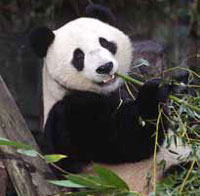
It's farewell for Hua Mei, finally. After more than a year of delays, the first US-born panda to survive is about to become the first US-born panda to be returned to its ancestral homeland, China.
The 4-year-old giant panda, one of the most popular animals at the San Diego Zoo, soon will be sent to the renowned Wolong Giant Panda Protection Research Center in Sichuan province, where she will enter into a breeding program.
Panda fans had lined up to see the playful black-and-white bear in the summer of 2002 when the zoo announced that Hua Mei soon would leave. The 12-year loan agreement that brought her parents to San Diego in 1996 mandates that any offspring be sent to China after turning 3 years old.
But the sad farewells and the marketing campaign, which featured Hua Mei seeming to wave goodbye, faded as her departure was postponed by bad weather and the outbreak of the SARS virus, which complicated travel for zoo and Wolong staff.
Don Lindburg, head of the zoo's giant panda team, said Friday her departure is now imminent, though the exact date was not announced.
"For sure this is the last weekend that Hua Mei will be available for public viewing. So those who do want to come one more time and say goodbye to her, they better do it," he said.
On Friday, after word got out that Hua Mei was leaving, fans who have followed her since birth were beginning to give their final farewells.
Ten-year-old Madison Jones offered her goodbye as Hua Mei stretched and dozed atop a branch: "I hope you have fun the rest of your life."
"I find it kind of sad," the San Diego girl said, "because she looks happy."
Carla Schwartz, a retired San Diego school teacher, said she had visited Hua Mei during the panda's infancy and often followed her on the zoo's "Panda Cam" Web site.
"I have kind of a lump in my throat. It's sad to see her go," she said.
The extra time Hua Mei had in San Diego made it more difficult, she said. "Two years ago we all said goodbye, but then she stayed and stayed and stayed. Now it's harder because we're more attached to her."
Other US zoos had seen female pandas give birth, but none of the offspring lived beyond a few days. Hua Mei, whose name means "China U.S.A," was the first to grow up before the eyes of US researchers.
The experience provided new insight into the early mother-cub relationship, the abrupt separation that occurs at about 18 months, and the development of a female cub through her first estrus, which Hua Mei recently experienced.
"It was almost comical the way she did it," Lindburg said, describing how she seemed to flirt with a male panda in an adjacent pen. "They way she went about it was almost playful."
In panda terms, Hua Mei is a young adult and likely could become pregnant by as early as this spring, he said.
Her genetic heritage - she is the only known offspring of the male Shi Shi - is important for the effort to increase the number of giant pandas, which are highly endangered due to loss of their native habitat. Only about 1,000 of them are thought to live in the wild. About 150 others live in captivity, with less than 20 outside of China.
For the past five months, the San Diego Zoo has had the rare chance to host four pandas at the same time: Hua Mei; her mother Bai Yun; a newly arrived male, Gao Gao; and Mei Sheng, the male cub born to Bai Yun and Gao Gao on Aug. 19.
Hua Mei's keepers are preparing her for the trip by exposing her to the large crate that will hold her during the flight to China. She will be accompanied by San Diego staffers who will help her adjust to her new home, where about 50 other pandas also live, Lindburg said.
"We're pleased that she can be an ambassador going back to China from this country. The symbolic value of this is tremendous," he said.
"Of course, we'd love to keep her here forever," he said. "But we can handle it. And we have another cub here who will fill, somewhat, the void as we watch Mei Sheng grow up."
(Xinhua News Agency February 7, 2004)
|

